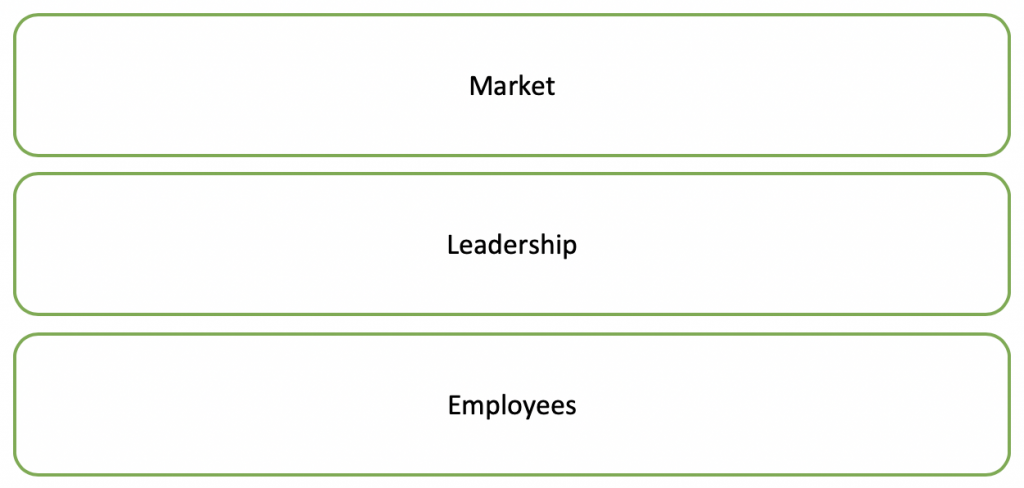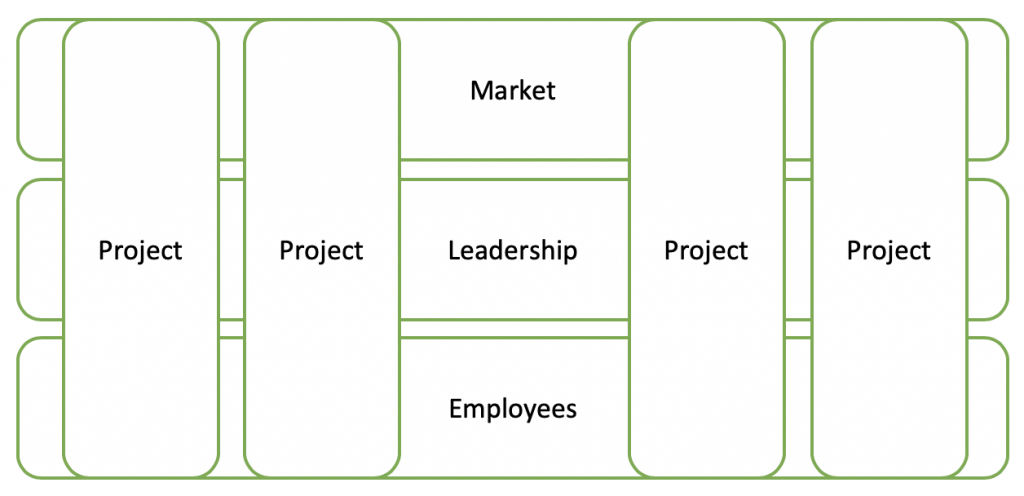Culture of Experts

Module #6
Unconventional Projects
A Culture of Experts is made up of numerous individual paths that each lead to a different end.
It Is up to organizational leadership to pull everything together and unify the accomplishments.
In module #3, we looked at Unconventional Experts at play; studying their characteristics as they bask in their favorite hobbies. With involved hobbies, we can see complex individual work-process and immeasurable commitment. In this module, we will look deeper into the complexities of Unconventional Experts, within the scope of career-driven projects.
How complex is a company?
Using a manufacturer for this example, how complex are its product offerings? What were the original product offerings and how much have they evolved? How complex are each of the individual departments that support its products?
Operations
Research and Development
Engineering
Testing
Production/manufacturing
Purchasing
Shipping and Receiving
Sales
Marketing
Customer support
Customer service
Human Resources
Finance
Others …
How complex is a market, where the products are sold? Who are the customers? What do the customer buying habits look like? What competing companies share the market? Through what channels do purchases get fulfilled?
How complex are the company’s sales and marketing programs, to sell the above product into the above market? What differentiates them from competing sales and marketing strategies?
How much does the CEO need to know to run the company? How much does the CEO need to know to make the company profitable? How much does the CEO need to know to strategically advance the company into the future? How much do the managers need to know, to make certain that their divisions, departments and workers coordinate and grow with the rest of the company? How much do the workers need to know, to perform their jobs effectively?
Whether a manufacturer or a service provider, all companies are complex. For larger companies, it is impossible for the CEO to have full knowledge of all moving parts. Fortunately, there is a management team to help. Beyond the direct guidance of management, there are organizational company-processes and individual work-processes in place, to coordinate everything on a moment-to-moment basis. If everyone follows process, the company will produce and live to fight another day. Over time, process needs to change, as the company needs to change; to keep up with a changing world. To push the company into the future, management must continuously manage proactive and reactive changes to the company’s strategies, structures and processes; following the vision of the CEO.
How complex is a job candidate?
Within a job interview, what if a candidate is asked:
If, for one year, you had to run this company as the CEO; would you be successful? In general, how would you approach this role?
Regardless of the specifics, the answer might reveal how much understanding a job candidate has regarding the immensity of the CEO role. Unconventional Experts would be expected to use their individual work-process to try to figure out what they would need to learn and who they would need to rely on, to start comprehension.
Luckily, CEOs do not expect their workers to manage the depth of complexity that they live with. Within a Culture of Experts, there is the potential to share complexity by breaking it up into smaller pieces:
UNCONVENTIONAL PROJECTS
By becoming project-oriented and leveraging the complexity of experts, an organization can move in directions that are not otherwise possible. A project-oriented company benefits in two ways. They can find achievement and they can build achievers.
Unconventional projects are traditional projects with a few differences:
• Unconventional projects are strategically filled by Unconventional Experts and revolve around their individual work-process.
• Unconventional projects have goals, however, they are not written in stone. They follow the work-journey of the Unconventional Expert.
• Unconventional projects host unconventional positions; which are unstructured, complex, creativity-driven and strategy-dependent.
• Unconventional projects expand positions, so that they must reach into unexplored areas of the company’s resources and markets.
• Unconventional projects create complex information, idea and strategy exchange; between project incumbents and leadership.
• Unconventional projects create team building benefits, as siloed departments come together for the purpose of project advancement.
• Unconventional projects create expanded intellectual curiosity, as project incumbents gain exposure to other facets of the company.
• Unconventional projects create increased exposure to complexities.
• Unconventional projects create increased exposure to mastery.
• Unconventional projects create exposure to customer needs and market demands.
• Unconventional projects create satisfaction for Unconventional Experts.
Unconventional projects should have latitude
For Unconventional Experts, failure is a platform for new and better ideas. When failure is investigated, there should not be finger-pointing to allocate personal blame. Within unconventional projects, all roads lead ahead. The point of failure is a crossroad that holds valuable information. That information needs to be a welcome traveler, as the journey moves forward.
Unconventional projects are related to opportunity
Projects often start as perceived opportunity. On a plot of land that shows potential, a structure starts to take shape. Finished projects are never identical to their initial perception. They always stand taller than missed opportunity.
Unconventional projects have a name
To Unconventional Experts, unconventional projects have an identity. They have substance and they evolve over time. Unconventional projects should have a name.
Unconventional projects should tell a story
As Unconventional Experts follow their work-journey within a project, they will go down a rabbit hole that will have many twists and turns. When all is said and done, this adventure will hold a story.
An unconventional project should be an idea box
The days of the physical idea box are gone. Most companies still struggle to find and explore good ideas. Where Unconventional Experts are at work, there will be good ideas.
Unconventional projects already exist, unseen, within an organization
Unconventional Experts will forward their own unconventional projects, as part of their work-journey. Whether or not they are recognized by management does not change the degree of effort. If such complexities exist, why wouldn’t leadership want to gain involvement to make certain the information and efforts are shared on a greater scale?


Do you like Culture of Experts? Share with a colleague or group right now:
Hi, I’m sharing an interesting website with you, check it out: www.cultureofexperts.com
Unconventional Project
The CEO of a large national corporation required all of its national sales teams to transition to new customer relationship management software (CRM). At a local level, one sales manager created an unconventional project to help his sales team with the transition. He assigned the project to one salesperson, who was technically inclined. This salesperson was to learn as much as possible about the new CRM and its migration. In addition to company-wide efforts, he was to conduct local trainings within regular sales meetings. As the project proceeded, it was quickly discovered that valuable database information from the original CRM would be erased within the company-wide transition. This information took many years to capture and could not be easily replaced. The project turned into a race, to manually copy-and-paste this information from the old CRM to the new CRM before it was erased. By the end of the company-wide transition, this location had copied and saved all of the valuable information into the new CRM.
Because the CEO showed no flexibility with this transition, the extent of this project was not shared outside of the one local office. In a perfect world, this valuable information would have been transitioned electronically, to all locations, as a part of the company-wide plan. Within the politics of a large corporation, a Culture of Experts existed within one location.
Corporate Culture Assessment Questions
Module #6 – Unconventional Projects
11) Does your company monitor and recognize the complexity-level of employee engagement?
12) Does your company typically create and assign projects that allow employees to gain deeper exposure to the company’s resources, markets and customers?
See all of the module assessment questions in module #11
Culture of Experts Interview Questions
Module #6 – Unconventional Projects
12) If, for one year, you had to run this company as the CEO; would you be successful? In general, how would you approach this role?
13) Within your career, describe the most impressive project that you worked on. What was the result of the project and what did you learn?
14) Within one of the personal project categories below, describe the most impressive large project that you worked on. What was the result of the project and what did you learn?
• Hobbies
• Arts
• Crafts
• DIY home improvements
• Connoisseurship
• Inventions
• Disciplines
See all of the module interview questions in module #12
All Rights Reserved. Unauthorized duplication is a violation of applicable laws.
Please proceed to module #7: Ideas
© 2025 Martin Haslinger
